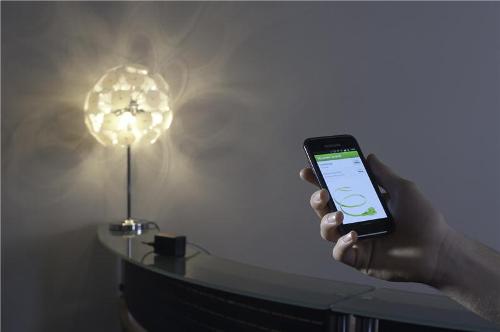Researchers at the Fraunhofer Institute for Communication Systems ESK in Munich in partnership with the Fraunhofer Institute of Industrial Mathematics ITWM in Kaiserslautern and industrial partner embedded brains, have successfully connected power outlets at homes wirelessly using the IPv6 protocol. Hence it is now possible to switch sockets on and off wirelessly using a device compatible with IPv6 such as a laptop PC or a smartphone from any location.
 The table lamp can be switched on and off by means of a smartphone app – thanks to the HexaBus wireless power outlet. (© Fraunhofer ESK)
The table lamp can be switched on and off by means of a smartphone app – thanks to the HexaBus wireless power outlet. (© Fraunhofer ESK)
The HexaBus home automation system developed by the ITWM as section of the mySmartGrid project comprises these wireless power outlets. The components of the HexaBus ensure that the smart home of the future becomes a reality. Hence household appliances are smartly controlled, reducing or optimizing consumption of electricity. For instance, the house owner can start the washing machine during cheap rate off-peak hours or operate the dishwasher when the solar panels are generating maximum power.
Along with wireless power outlets, a specially designed USB stick is employed that can be plugged into any compatible router. The command is then entered by the user to switch on the appliance through an Android compatible smartphone App or a standard web browser. The data is then forwarded by the router and stick to the power outlet. The two-way communication feature enables the wireless power outlet to transmit data to the smartphone, providing information to the users as to how much the various appliances are consuming at any particular time. Hence the power consumption can be optimized by the user.
A distinct IP address is provided to each of the power outlet and hence to each connected appliance allowing direct access.
Hildebrandt and his team designed special protocol software and an extension to the Contiki operating system, enabling it to handle the 6LoWpan (IPv6 over Low power Wireless Personal Area Network) communication protocol. Embedded brains will be commercially producing these HexaBus power outlets.